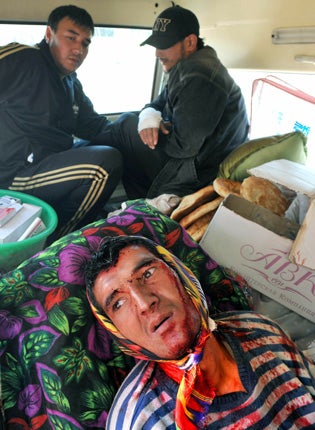Uzbeks run for cover as rioting youths seize army equipment
Kyrgyz troops accused of participating in attacks as violence spreads to rural areas

The sound of crying fills the air at this makeshift refugee centre just inside Uzbekistan where hundreds of Uzbeks fleeing mob violence in neighbouring Kyrgyzstan have found shelter. There are no young men, just women, children and the elderly. Most of the working-age men were not allowed across the border, and many stayed behind to defend their property after marauding Kyrgyz gangs embarked on three days of killing in the worst ethnic violence in the country for two decades.
As mobile phone networks crashed, none of the women here are able to contact their male relatives back in Kyrgyzstan where at least 124 people have died during days of unrest. None of them know if their husbands and sons are still alive. This is one of several camps that the Uzbek authorities say they have set up for refugees who surged across the border over the weekend. The border has now been closed to further traffic, leaving thousands stuck.
A Moscow-dominated security group yesterday stopped short of pledging troops to restore order, despite requests from the interim Kyrgyz government and the ousted president it replaced in April, Kurmanbek Bakiyev. However, the regional alliance, the CSTO, said that it may send helicopters, trucks and other equipment, according to Russian agency reports, to help the government quell the unrest.
Rioting and attacks on Uzbeks, who make up about 15 per cent of the population, appeared to be fewer than in previous days but there were still reports of violence across the south, particularly in the town of Jalal-Abad.
"A crowd of young people rushed through the streets in the morning, destroying everything in their wake and shooting," a witness told Russia's RIA Novosti news agency. "The crowd then moved towards outlying villages. They have armoured vehicles, which they seized from an army base overnight."
By the evening, the violence had calmed, but the streets were eerily quiet as those left in the city did not dare to venture outside. Witnesses say that there has been almost no military presence on the streets of Osh and Jalal-Abad during the past few days, and many of the Uzbek refugees allege that Kyrgyz soldiers joined in the massacres.
At the hospital in the city of Andijan, on the Uzbek side of the border, doctors told Russian news agencies that more than 7,000 people had presented themselves for treatment, including 80 with gunshot wounds. They also said 80 pregnant women in danger of suffering miscarriages had been admitted to the hospital. Aid agencies spoke of a "humanitarian catastrophe", saying that the tragedy of so many deaths and injuries would be compounded by the poverty and continuing political disruption in the country. "This is an extremely poor country, and the April instability came just as it was planting season, meaning that a lot of crops haven't been planted this year," said Will Lynch, Central Asia director for Save the Children, who is in Bishkek.
"Add to this the fact that so many shops have been looted and there could be serious shortages. Nothing has been resolved, and we now have thousands of people who are a lot worse off than they were a week ago."
It is still unclear what exactly served as the trigger for the clashes. The provisional authorities in Bishkek have claimed that the violence was provoked by paid agents loyal to the former president, while rumours abounded on the ground of a conflict in a local casino or a dispute that started when a taxi passenger refused to pay his fare. Stories about a group of Uzbek men raping Kyrgyz women fuelled the anger.
Whatever started the violence, it quickly spiralled out of control. An American living in central Osh, who did not want to be identified, described a scene of terrifying mob fervour as the rioting began late on Thursday night.
"I saw a fire burning in the street about a block away and men screaming loudly around it," he said. "I thought they were just screaming to put out the fire. I waited a bit and noticed the fire growing and growing. It cast a red glow across the whole street I lived on. I then turned to the left and saw a hundred or more local men walking down towards my building carrying axes and shotguns." Later, he said, the crowd began throwing stones through windows, and looting shops along the street.
The full scale of the violence is unclear, but it seems that the current official death toll is likely to rise dramatically. Uzbek community leaders in Jalal-Abad claimed that 700 people had been killed there alone.
Video of ethnic Uzbeks trying to escape Kyrgyzstan and enter Uzbekistan
Subscribe to Independent Premium to bookmark this article
Want to bookmark your favourite articles and stories to read or reference later? Start your Independent Premium subscription today.

Join our commenting forum
Join thought-provoking conversations, follow other Independent readers and see their replies